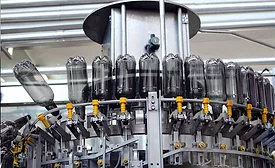Home » supply chain
Articles Tagged with ''supply chain''
Activities must be defined to benefit pre-distribution efficiencies
Read More
How to achieve efficient run utilization
Tips to maximize product movement within a beverage warehouse
November 14, 2016
Beverage plants evaluate production lines
Distribution focus can overlook importance of package line evaluations
July 15, 2016
Benefits of all food-grade lubricant cabinet
Transition will minimize contamination risks of lubricants
July 15, 2016
Nespresso to bring Cuban coffee to US
Limited-edition variety to hit store shelves this fall
June 21, 2016
MHI recognizes innovation Modex 2016
Association announces dates for ProMat 2017
May 16, 2016
Automation driving use of DSD technology solutions
Technology also can aid in marketing capabilities
April 15, 2016
How to maximize a warehouse's core assets
Facilities, equipment and personnel vital to beverage operations
March 15, 2016
Repair, replace rationales at forefront of beverage operations
Cost major concern in equipment evaluations
January 15, 2016
Reusable packaging offers economic, social and environmental savings
ROI and environment influence supply chain systems
January 15, 2016
Elevate your expertise in the beverage marketplace with unparalleled insights and connections.
Join thousands of beverage professionals today. Shouldn’t you know what they know?
JOIN NOW!Copyright ©2025. All Rights Reserved BNP Media.
Design, CMS, Hosting & Web Development :: ePublishing




